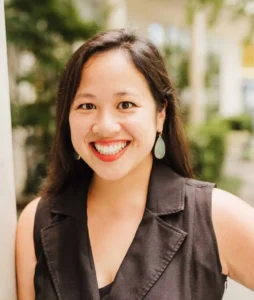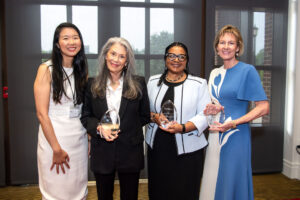In honor of Asian American, Native Hawaiian, Pacific Islander Heritage Month, we are doing a series of interviews with our Senior Leaders. Hear how their cultural experiences have informed their leadership and how they are innovating across our global programs.

Jessica Pham
Jessica Pham is Nomi Network’s VP of Global Operations. She oversees global programs, finance, operations, people and culture, and organization-wide performance against strategic goals. She is also responsible for strategic planning, DEI, and leadership development.
How has your heritage shaped you as a leader?
I am a second-generation Vietnamese-American, the daughter and granddaughter of immigrants and refugees. This identity deeply forms my leadership. I often think about what my family endured—the desperation and fear that drove them to leave their home behind, the bravery to risk imprisonment and death, and the wild hope it took to envision a future for themselves in a country where they knew they were not fully welcomed. All along the way were heartbreaking choices they had to make to pursue a better future for themselves and future generations.
I hold all of this in who I am as a leader. My family’s history motivates my work to create opportunities for women and girls who are affected by poverty, violence, and trauma. Thanks to my mother and grandmothers, I have models of holding a vision in the face of adversity, making difficult decisions, being responsive and adaptable, and pursuing goals with a collectivist and collaborative mindset. Leadership is all of those things to me.
Who are the AANHPI leaders who’ve inspired you?
Sadly, I struggle to think of AANHPI leaders who are famous enough to answer this question traditionally. That’s not to say that there have not been Asian American leaders who have done significant, impactful things. However, few have gained mainstream notoriety, which means that I and many other Asian Americans did not have many mirrors of what it looked like to be an Asian American leader growing up.
I have many Asian American female friends who are peers and mentors in my life who inspire me today. Tracey Gee, a leadership coach, reminds me that leadership doesn’t look any one way and that each person has a unique brilliance they bring to the world. Erna Kim Hackett started Liberated Together, a community of practice for women of color, queer WOC, and non-binary folks. I love how Erna speaks truth to power in a way that creates space for others. Erina Kim-Eubanks is a dear friend, Presbyterian minister, and hospital chaplain. There is a deep strength to her as she wrestles daily with how to respond to suffering and injustice while remaining soft-hearted and hopeful. And, of course, my co-leaders at Nomi Network. Together, I think we embody the diversity of experiences and approaches within Asian American leadership.
How are you innovating in your leadership?
Traditional models of leadership center around hierarchy and power. At Nomi Network, I am exploring how to balance ownership and the decisive leadership that an organization needs to be effective while simultaneously democratizing decision-making and power in a still efficient way. I wouldn’t say that I’ve figured it out, but I am committed to trying, failing, and learning how to do this better.
How are you helping others to innovate or advance in their leadership?
As a female leader for a women’s empowerment organization, I take it as a mandate to invest in female leaders and to create an environment where women can thrive in the workforce. I have six direct reports, all of whom are managers and directors and mothers. As a working mother myself, I know that my leaders are juggling more than they should and that it is an honor and privilege for them to choose to work with us. Every year, I am building more ways for it to be sustainable for women to work for Nomi Network, particularly mothers/caretakers. On a structural level, this includes remote/hybrid work, trust-based management, schedule flexibility, paid time off for childcare, and childcare stipends for traveling parents. But more importantly, I try to build a culture where moms feel safe and celebrated in the struggle to be a working mom. There are things I intentionally model, such as taking breaks to breastfeed, putting blocks on my calendar for dropping off my kids at school and making space to discuss the challenges and joys of parenting. Not every woman chooses to have children or to work if they do have children, but I want to do what I can to make Nomi Network a place where it’s possible to do both and advance if someone wants to try.
I hesitate to call this innovative, but at the same time, it’s rarely done. And even within Nomi Network, we have a long way to go. It is challenging to prioritize investing in people within the resource-constrained realities of a nonprofit, where we are disincentivized from investing in “operational” costs. However, caring about people and investing in their development is not a means to an end for me, nor is it part of a double bottom line. I view leadership development as the most strategic and authentic way for an organization to live out its mission.




